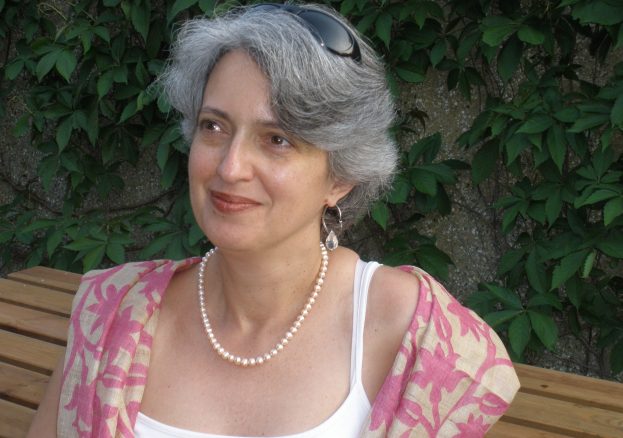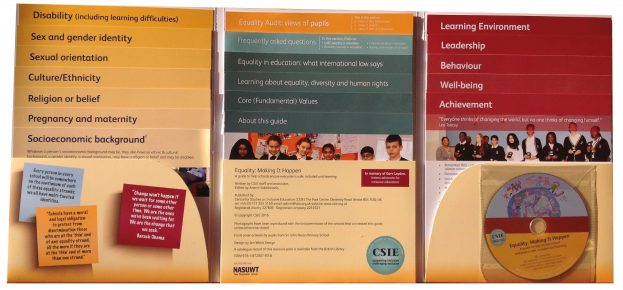
It appears that the Brexit vote of June 2016 has led many people to believe that they no longer need to conceal prejudice, aversion or hate. Recent evidence suggests that bullying in schools, like hate crime in society, is increasing. The government’s hate crime action plan[1], clearly states that schools have an important role to play to reduce hate crime in society: unless prejudice is challenged and young people are educated away from it, the action plan states, hate crime will continue.
An increasing number of people – children as well as adults – do not feel welcome, visible or respected in some schools; for example, people from minority ethnic or cultural backgrounds, those who may challenge conventional ideas of gender or those who have impairments and/or learning difficulties. It is important to remember that we all have multi-faceted identities and, therefore, these groups are not mutually exclusive. In other words, we all have an ethnic or cultural background, a gender identity, a sexual orientation, a religion or belief (or no belief) and may be (or may one day become) disabled. The risk of cumulative discrimination is not to be underestimated.
A report[2] from the Office of the Children’s Commissioner suggests that the current system of school exclusions is in breach of the UN Convention on the Rights of the Child and of UK legislation. It identifies disturbing variations in exclusion rates between children with different characteristics and flags up the compounding effect of this: Black boys with labels of SEN who are eligible for free school meals were shown to be 168 times more likely to be permanently excluded than white girls from middle class families and no labels of SEN.
Schools in England previously had a duty to record and report racist incidents to their local authority, but this requirement was removed in 2012. As a result, there is no information available at national level on racist or religiously motivated incidents in English schools since 2010/11.
A recent report[3] from the Equality and Human Rights Commission states that racist incidents are under-recorded and under-reported in schools, partly due to a lack of leadership on the issue and partly due to a lack of staff training in some schools. The report also suggests that racist language is still commonly used/heard in primary and secondary schools, and that such language sometimes relates to religion.
The most recent report[4] from Childline on bullying in schools says that there has been an increased call for their services in relation to racist/faith-related bullying following high profile terrorist attacks. A 15-year-old girl is quoted as saying:
“Ever since the Paris attacks, I have been getting bullied really badly at school. I wear a headscarf and the bullies think that just because I am Muslim that I support ISIS. It’s gotten so bad that I have started to miss school, which I never do. The teachers can see what’s happening but they don’t seem to want to get involved or do anything about it. I just want to be treated like a human being and the same as everyone else.”
Young people who contacted Childline during these times talked about bullying in and out of school that has made them feel increasingly isolated and withdrawn. The report also says that some children are contacting Childline because they are afraid to speak out or because they have seen that speaking out can make things worse in school.
A recent report[5] from the British Youth Council warned that racist incidents are covered up in schools to protect their Ofsted ratings. Racism and religious discrimination, the report states, remain an issue and a cause for concern in schools today. The report goes on to say that racism and religious discrimination are dismissed as “banter” and teachers need better support to have the confidence to deal with these issues.
Last year the Race Disparity Audit[6] confirmed that prejudice-based bullying continues to be rife in schools and that its impact can be detrimental.
All of this means that there is a pressing need to transform current attitudes and practice in education. The Equality Act protects young people from harassment and discrimination, but education often lets them down. Bullying and discrimination can take a toll on young people’s physical or mental health, reduce their self-esteem, hinder their learning and, therefore, limit their life chances.
Schools are under considerable pressure to ensure high exam results and often feel unable to devote time or energy to promoting equality and protecting children’s rights. This means that in some schools bullying continues to be rife, and its impact can be detrimental. National and international legislation and guidance stipulate every child’s right to a good education without discrimination. In practice many schools, local authorities and academy chains discriminate against people from minority groups and are rarely being challenged.
In response to all this, CSIE now offers a range of services for schools, including equality workshops, equality audits involving the whole school community (pupils, their parents, staff and governors) and a practical and user-friendly toolkit to help reduce bullying, address prejudice and promote equality holistically. Equality: Making It Happen – a guide to help schools ensure everyone is safe, included and learning was created in collaboration with schools, sponsored by teachers’ union NASUWT, has won an international award (Innovative Practice Award from the Zero Project, for a world with zero barriers) and is being translated into Spanish, Portuguese and Welsh, with more translations in the pipeline.
Equality: Making It Happen is relevant to children and staff in primary and secondary schools and places pupils at the heart of protecting children’s rights. It is made up of succinct reference cards which offer: key information, practical advice, suggested activities, examples of good practice, equality audit tools and links to further information and support. Materials can be used for teaching and learning activities, assemblies, peer mentoring, school council, staff training, equality policy and whole school development.
The toolkit has been highly praised by teachers and school leaders (“An absolutely amazing resource that is easy to use and extremely well designed”) and a recent independent review concluded: “This should be on every school’s bookshelf”.
 Equality: Making It Happen is available for only £30 +p&p if bought directly from www.csie.org.uk/resources (RRP £75).
Equality: Making It Happen is available for only £30 +p&p if bought directly from www.csie.org.uk/resources (RRP £75).
Special offer for readers of Black History Month magazine
Buy both resources and save £10! (with an image of both resources and their respective prices, and something that says they can get both for £60 total, including delivery)
The Centre for Studies on Inclusive Education (CSIE) is a national charity (327805), founded in 1982, working to promote equality and eliminate discrimination in education. CSIE seeks to transform education so that everyone can be safe, included and learning in school, regardless of age, disability, gender, gender identity, sexual orientation, culture/ethnicity, socioeconomic background, religion or belief. Activities include: equality audits; equality workshops for pupils, educators, parents and governors; talks, training & consultancy nationally and internationally; and a wide range of resources for schools, local authorities, academy chains, parents and students, including student teachers.
[1] Home Office (2016) Action against hate: the UK government’s plan for tackling hate crime. www.gov.uk/government/publications/hate-crime-action-plan-2016
[2] Office of the Children’s Commissioner (2010) They never give up on you – Office of the Children’s Commissioner School Exclusions Inquiry https://www.childrenscommissioner.gov.uk/wp-content/uploads/2017/07/They-never-give-up-on-you-final-report.pdf
[3] Equality and Human Rights Commission (2016) Healing a divided Britain: the need for a comprehensive race equality strategy https://www.equalityhumanrights.com/sites/default/files/healing_a_divided_britain_-_the_need_for_a_comprehensive_race_equality_strategy_final.pdf
[4] NSPCC (2016) What children are telling us about bullying. London: NSPCC. https://learning.nspcc.org.uk/media/1204/what-children-are-telling-us-about-bullying-childline-bullying-report-2015-16.pdf
[5] British Youth Council Youth Select Committee (2016) Young people and the issues of racism and religious discrimination https://www.byc.org.uk/wp-content/uploads/2016/11/BYC-Report-2016-WEB.pdf
[6] Cabinet Office (2017) Race Disparity Audit Summary Findings from the Ethnicity Facts and Figures website https://www.ethnicity-facts-figures.service.gov.uk/static/race-disparity-audit-summary-findings.pdf
